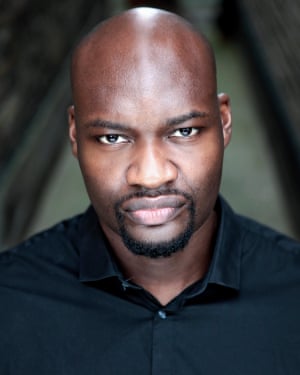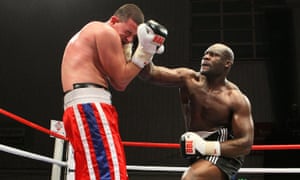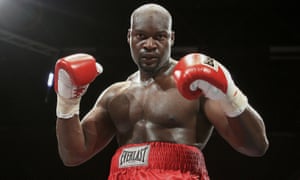Larry Olubamiwo: ‘Athletes dope for money. My goal was to make a living’ | Donald McRae | Sport
“I have a very pragmatic approach to doping,” Larry Olubamiwo says after he has told me of another sporting great he is convinced used performance-enhancing drugs. “I make it akin to life and the saying that links both is ‘better living through chemistry’. As a society we use drugs to enhance ourselves. We wake up and drink a cup of coffee that has caffeine in it. That’s a drug. People drink alcohol to numb pain or relax. That’s a drug. Nicotine is a drug.
“What is the difference between someone using these drugs and an athlete using other drugs to improve themselves? Many athletes dope to make money for themselves and their family. My first goal as a boxer was always to make a living.”
The former heavyweight boxer was banned for four years in 2012 after using 13 banned substances including EPO, human growth hormone and steroids. His ban was then reduced to a year after Olubamiwo offered information to UK Anti-Doping.
Olubamiwo is now scathing about Ukad and the 41-year-old speaks with breathtaking freedom, or audacity, when suggesting that “probably 90%” of elite-level boxers today are doping. It sounds outlandish but Olubamiwo, who has a degree in pharmaceutical chemistry, is worth hearing. Most of his allegations are libellous and, without concrete proof, cannot be printed. But even if only a tenth of his revelations can be proved it would be a shocking indictment of sport.
Administrators, promoters, sponsors and romantic sports fans will dismiss Olubamiwo as an irksome carnival barker. Eddie Hearn has already ridiculed Olubamiwo’s allegations as “a ridiculous statement” which is wrong to “single out pay-per-events as they get additional testing”. Hearn argues that pay-per-view fighters “have anything between 8-14 week testing programmes with Vada [the Voluntary Anti-Doping Association] where they are tested two to three times a week”. Olubamiwo, however, believes doping is so rife that performance-enhancing drugs should be legalised. “I’m a big Ben Johnson fan,” he says of the disgraced Canadian sprinter who was busted for doping after the 100m final at the 1988 Olympics.
Olubamiwo is kind towards Charlie Francis – Johnson’s denigrated former coach. “I’m a big Charlie Francis fan. Francis believed hormones made naturally in the body – EPO, human growth hormone and testosterone – should be allowed as supplements. Maybe ban the synthetic stuff – anabolic steroids and other drugs. He reasoned that stuff made in the body was safe if taken in reasonable doses.

“I’ve always subscribed to his thinking that this would make it a more level playing field. This is one of the main reasons for doping because it’s never equal. One guy has a better coach than another. One guy can afford better equipment and warm-weather training. Sport is never fair.
“Take creatine. When it first came out they tried to ban it. But when they realised it was natural [and produced in muscle cells], and occurred in food, they couldn’t ban it. Creatine improves performance a helluva lot. It’s safe but if people use it too much they [can] develop problems.
“What’s the difference between creatine and testosterone? It’s hypocrisy to say one thing is OK and the other isn’t. If you allow athletes to use these substances it makes it more equal. For safety, you can test athletes’ health markers and make sure they’re not using more dangerous stuff.”
Setting aside moral concerns about legalising EPO, human growth hormone and testosterone, doping increases the danger of boxing. Boxers are maimed and killed in the ring. If power is enhanced artificially even more damage will be caused.
“I hear that argument all the time,” Olubamiwo says. “But most boxing deaths happen because of the accumulation of blows. If you’re enhanced, if you have more power, the fight wouldn’t last as long. Your opponent wouldn’t sustain as much damage. If you’re on the receiving end and you’re enhanced, it increases your resilience to punishment. It actually helps fighters both ways.”
This seems a spurious argument. No supplement can safeguard the brain when a pulverising blow smashes into a boxer’s head. “It’s not going to safeguard the brain,” Olubamiwo agrees, “but growth hormone can thicken your skull. It can increase the water around the brain inside the skull.”
I have heard too many neurosurgeons talk about the damage done to a brain by a heavy blow to believe Olubamiwo’s theory. But, rather than dismiss everything he says, his story offers valuable pointers into a doping mindset. Before he became a boxer Olubamiwo was a promising sprinter who began doping at 19. He plays down his own sprinting prowess. “Dwain Chambers is my age. When I was running 100m in 10.7, he was running 10.1.”
Chambers was eventually exposed for doping. “He probably was using then – but so was I. It wasn’t just at the top. It was most athletes trying to get to the top. At first I thought it was just sprinters but then I got friendly with long-distance runners and throwers. Doping’s across the board.”

At 20, Olubamiwo turned to boxing. He was even more convinced of the need to dope because “you don’t go into a gun-fight carrying a knife”. Doping was so pervasive that Olubamiwo did not feel any ethical qualms. “I’m not saying everyone is on drugs. But a sizeable amount of people are on drugs. I made the informed decision to use and compete with the best.”
Olubamiwo was jailed between the ages of 21 and 26 for armed robbery. He came out of prison and completed his degree and was a day short of 30 when he finally made his pro boxing debut in October 2008. Promoted by Frank Maloney, he won 10 of his first 11 fights.
Olubamiwo describes how easy it was to gain a supply of PEDs. “Only EPO is more challenging. It’s not as available as anabolic steroids or growth hormone. It’s a stamina drug, a very niche drug. I got EPO online from a pharmaceutical company in China.”
With his scientific knowledge did he consider the side-effects? “Side-effects come with abuse. I always thought that use is when you use it to optimise yourself without compromising your health. Abuse is compromising your health. I did things very safely. If I didn’t have my knowledge, I would have hired someone. I didn’t take huge doses because I’m usually cautious.”
Does he have any side-effects now? “Not at all. Healthy as a horse.”
Was there more doping in boxing than athletics? “That’s an interesting question. At first I would have said athletes were the biggest users. But going further into boxing I realised it was pretty much the same. It’s just that boxing has been very late to anti-doping.”
Olubamiwo was not tested once between October 2008 and January 2012. “That’s what led me to become complacent with my protocol. When I started I was very meticulous about when I came on and off. Wrote down dates. Clearance times. But as I wasn’t being tested, I thought: ‘I don’t have to keep track.’”
If he had remained rigorous, Olubamiwo believes he would never have been caught. But his career hit the skids when he lost a controversial decision against Sam Sexton in January 2012. The real controversy, however, soon broke. “I knew the writing was on the wall because there was no way I could flush EPO out my system,” he recalls. “I was tested before the fight.”
The US Anti-Doping Agency had tipped off Ukad because it had discovered Olubamiwo’s name while trawling through the records of all those who had ordered EPO from China. Olubamiwo did not fight the charges because he was “sick of the lies”. He harbours no bitterness that he is one of the minority of British boxers who have been caught cheating. His anger towards Ukad stems from the fact that he claims the agency broke a legally binding contract to return his 3,000 pills once his suspension was completed.
He says the tablets were steroids and that, in ordinary society, “they are 100% legal”, adding: “Legally they had no right to take them off of me in the first place. Secondly, why go through that whole cock and bull thing of signing a contract with me when you knew you weren’t going to give them back? That won’t look good in front of a judge. However you look at this, they’re in serious trouble.

“After I corresponded with them for months, they said they had lost the pills and didn’t offer me any compensation. I asked for £20,000 compensation. Not just because of the value of the pills but because of the value of the information I gave. They wouldn’t have got that information if that contract wasn’t signed. So they got it through false pretences. That’s why I’m livid.”
Surely it would be unethical for Ukad to return medication banned in elite sport to a convicted doper? “If they want to look at things ethically, we need to look at things legally. Legally, they weren’t even allowed to take that stuff off of me.
“They did it under false pretences by saying: ‘They’re a class A drug blah blah.’ They were perfectly legal to have in my possession. They’ve also broken a contract. We all know legally trumps ethically. I’m already talking with a barrister and taking action. They can’t be seen to get away with this.”
Olubamiwo is deeply cynical. “A whole host of shady things are happening with anti-doping organisations around the world. You just think: ‘Woah, what is the point of having anti-doping?’ It seems like you catch people who are scapegoats. The guys who are doing the real doping – and professionally employing people to help them dope – you can’t touch. You have no desire to touch them because you don’t have the money.”
Is there still only limited testing of British boxers? “Without a doubt. Ukad have a budget of £8m across all sports. Not just boxing. That’s a drop in the ocean. As much as they talk about anti-doping and how much testing they do, the reality is they can only do so many tests. They target suspicious people instead of doing random testing.”
Boxers who fail tests, in turn, still end up being offered lucrative contacts or fights and he names Saul “Canelo” Alvárez, Alexander Povetkin and Lucas Browne. Olubamiwo says Povetkin’s inclusion on numerous British bills, including a world heavyweight title fight against Anthony Joshua in 2018, “beggars belief”, adding: “Povetkin’s been caught twice. Browne’s been caught twice. I mean, come on.”
Olubamiwo does not believe anything will change in regard to sport and doping. “Oh no, because money talks. The little guys are scapegoats and the big fish get away with it. That’s how these anti-doping organisations operate. Occasionally they’ll get a big fish, but it’s usually because they’ve pissed off too many people higher up. Lance Armstrong pissed off way too many people. Usually, if you’re a big fish, and you’re not an arsehole, you will get away with it.”
It’s a bleak view but Olubamiwo shakes his head when I say I can’t imagine him ever watching sport again. “I’ve always loved sport. I’ll always watch sport regardless. I’ll watch boxing and the Olympics. It doesn’t sour me to sport at all. I just know the truth about it.”
